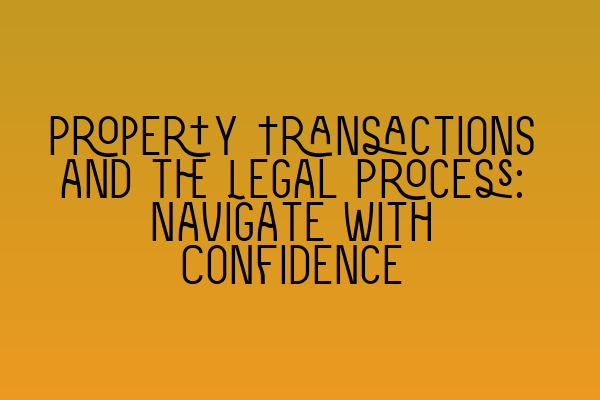Property Transactions and the Legal Process: Navigate with Confidence
At SQE Property Law & Land Law, we understand that property transactions can be complex and overwhelming. Whether you are buying, selling, or leasing a property, it is essential to have a solid understanding of the legal process to ensure a smooth and successful transaction. In this blog post, we will guide you through the key steps involved in property transactions and provide expert insights to help you navigate with confidence.
The Legal Process
1. Unlocking Legal Research Skills
Before embarking on any property transaction, it is crucial to conduct thorough legal research. Understanding the relevant legislation, case law, and legal principles will empower you to make informed decisions and mitigate potential risks. Our blog post on Unlocking Legal Research Skills for SQE Success provides valuable insights into honing your legal research abilities.
2. Functioning Legal Knowledge (FLK)
A solid foundation of functioning legal knowledge is essential for property transactions. Understanding core legal concepts, such as contract law, land law, and property law, will enable you to navigate the legal process effectively. If you are a candidate preparing for the SQE, our blog post on Functioning Legal Knowledge (FLK): Core Concepts for SQE Candidates will provide you with comprehensive insights.
The Key Steps
1. Property Research and Due Diligence
Before engaging in any property transaction, it is crucial to conduct thorough research and due diligence. This includes examining the title deeds, checking for any encumbrances or restrictions, and investigating the property’s history. By understanding the property’s background, you can assess its suitability for your intended use. For more guidance on due diligence, check out our blog post on Case Studies in SQE: Applying Knowledge to Real-Life Scenarios.
2. Negotiating and Drafting Contracts
The negotiation and drafting of contracts are critical stages in property transactions. Engaging the services of an experienced solicitor will ensure that your interests are protected, and the contract accurately reflects the agreed-upon terms. Understanding the essential elements of a property contract is vital for successful negotiations. Refer to our blog post on SQE2: Everything You Need to Know About the Second Stage Exam to delve deeper into contract law.
3. Property Exchange and Completion
Once the contracts are finalized and signed by all parties, the property exchange can take place. During this stage, the buyer will typically pay a deposit, and a completion date will be set. On the completion date, the remaining balance is paid, and legal ownership of the property is transferred. It is crucial to have a clear understanding of the exchange and completion process to ensure a seamless transition. For additional resources, our blog post on Essential SQE Textbooks: Building a Solid Foundation for Exam Prep provides a list of recommended textbooks to enhance your knowledge.
Conclusion
In conclusion, property transactions can be complex, but with the right knowledge and guidance, you can navigate the legal process with confidence. By conducting thorough legal research, understanding functioning legal knowledge, and following the key steps involved, you can ensure a smooth and successful property transaction. At SQE Property Law & Land Law, we are committed to providing expert advice and assistance to help you achieve your property goals. Contact us today for personalized assistance tailored to your specific needs.
